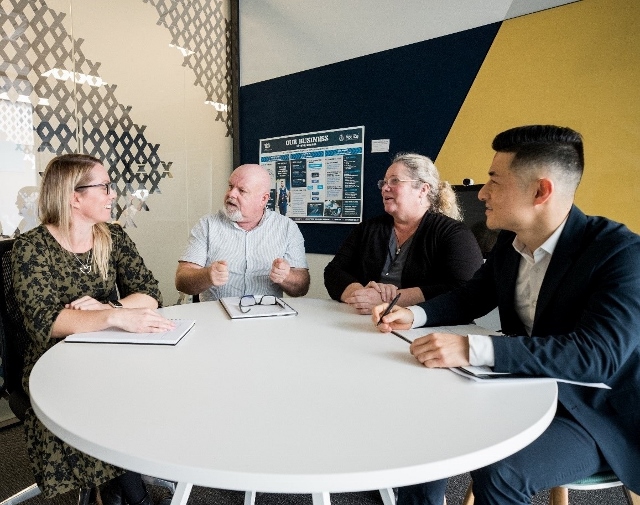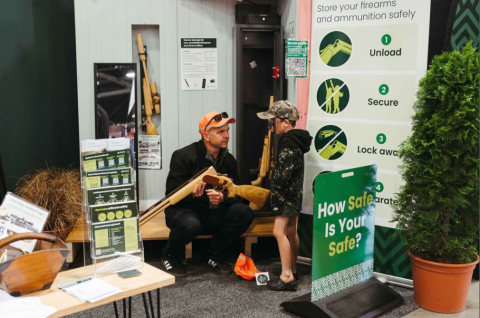The video opens to show a man walking down a suburban street in New Zealand. It’s a sunny day and he’s walking his dog. A jogger runs past.
Male voiceover: “The best part about working for the Firearm Safety Authority Te Tari Pūreke…”
Man: (in background) “Morning”
The scene changes to show the same man in an office. He’s wearing a suit and looking directly towards the camera. He’s called Richard and he’s a Senior Leader at Te Tari Pūreke.
Richard: “…is that you know you are making a real difference.”
The scene changes to show Richard walking down the street. He talks to his dog.
Richard: “come on boy, let’s get you home.”
The scene cuts to show Richard getting into his car.
Richard’s voiceover: “The Authority oversees the Firearms Registry and regulates the legitimate possession and use of firearms.”
The scene shows Richard inside his car and then driving down the street.
Richard’s voiceover: “Our vision is that the possession and use of firearms in Aotearoa is the safest in the world.”
The scene changes to show Richard in the same office as before. He’s looking directly at the camera.
Richard’s voiceover: “That's a pretty purposeful reason to get out of bed in the morning.”
The scene changes to show Richard in the Te Tari Pūreke office walking towards a female member of staff. She smiles to greet him. The wall behind them is dark green and has text in white. The signage reads: 'Te Tari Pūreke, Firearms Safety Authority'.
Richard’s voiceover: “I think what surprises a lot of people interested in working here is you don't need to be a police officer to work with us.”
The camera zooms in to show the female staff member talking to Richard.
Richard’s voiceover: “You don't need to know all about firearms, as we train all our people with the skills they need to do the job.
The scene cuts back to Richard looking directly at the camera.
Richard: “All our people are making a real difference in the safety of our communities.”
The scene changes to show a group of office staff sitting around a table.
Male voiceover: “What we are doing impacts all of Aotearoa.”
The scene changes to show a male member of staff called Jesse, a Change Analyst. Jesse looks directly at the camera.
Jesse’s voiceover: “So not just the 240,000 licence holders that have firearms, but also the other 4.7 million people around the country who just want to be safe…
The scene cuts back to the office staff sitting around the table.
Jesse’s voiceover: “…and want to make sure others are safe as well.”
The scene changes to show Richard walking into a busy office, with staff sitting at desks, typing on laptops, or looking at monitor screens.
Richard’s voiceover: “One of the roles we recruit for is the Arms Administrator.”
The scene changes to show a busy office, the camera follows a female staff member to her desk. She sits down in front of a monitor and puts on a headset.
Richard’s voiceover: “In this role, a lot of important work comes your way each and every day.
The camera moves around to show the female staff member sitting down at a desk. There are other staff members working at desks alongside and behind her.
Richard’s voiceover: “You support firearms licensing, the registry system, and the wider work of the Authority.”
The camera moves to show another female member of staff at her desk. She is talking to another staff member. The camera cuts back to the female member of staff with a headset on, sitting in front of a computer monitor.
Richard’s voiceover: “You need an eye for detail, good communication skills, and the ability to work well with others.”
The next scene is the female staff member looking directly at the camera. Her name is Izzy and she’s an Arms Administrator.
Izzy: “Communication is definitely key.”
The scene changes to show Izzy working at a table with a laptop talking to a male staff member.
Izzy’s voiceover: “Being able to have those conversations with my team, but then also being able to
relay the information back to our firearms licence holders.”
The scene changes to a female staff member in the office facing the camera. Her name is Rovine, she’s an Arms Administrator.
Rovine’s voiceover: “You just really need to be enthusiastic and give them the best service you can…”
The scene changes to show Rovine wearing a headset and speaking into the headset microphone.
In the next scene, we see a Firearms licence holder talking on his phone. There is a firearm mounted next to him and a laptop on the desk.
The scene changes back to Rovine wearing a headset and nodding her head.
Rovine’s voiceover: “…and making sure you give them clear and concise information.”
The scene changes to a male staff member. Jesse looks directly towards the camera.
Jesse: “The culture is new, which is a very good thing…”
The scene changes to show Jesse walking into an office lunchroom. A group of staff are standing around a kitchen bench eating food.
Jesse: “…we can come together and really define and shape what it looks like.”
The next scene is a male staff member looking directly at the camera. His name is Gideon, and he’s an Arms Officer.
Gideon: “We are in a space, in an environment….
The scene changes to show Gideon in the lunchroom with other members of staff eating together. The camera angle changes to show other staff enjoying lunch.
Gideon’s voiceover: “…that respects each other's cultures and experience and knowledge.”
The scene changes to a female member of staff facing the camera. Her name is Lauren, she’s an Advisor Firearms Ecosystem.
Lauren: “There's definitely a really good level of humour here.”
The scene changes to show Lauren and other members of staff laughing and enjoying lunch in the lunchroom.
Lauren’s voiceover: “…and I love that people turn up every day because they care about what they're doing.”
The scene changes to a female member of staff in the office looking at the camera. Her name is Lyle and she’s an Arms Officer.
Lyle: “There's so many passionate people who know a lot about the firearms business…”
The scene changes to show Lyle talking to a male staff member in the office lunchroom.
Lyle’s voiceover: “…and everyone's encouraged to bring themselves to work, and it's a really positive place to be.”
The scene changes to show the outside of a small wooden cabin. There is a young boy standing on the deck, his father, a hunter, is walking across the lawn in front of the cabin to greet Lyle who is walking towards him from the left of camera. Both are extending their hands towards each other.
The scene changes to show a close up of the hunter as he shakes hands with Lyle. The two turn their backs to the camera and walk in the direction of the cabin deck. The boy walks away from the approaching adults, and they all walk towards the cabin door.
Richard’s voiceover: “Another key role for us is our people working face to face out there in the community to ensure people are using guns responsibly.”
The scene changes to show a close up of a female hunter wearing a white wool beanie and gloves, holding open a firearm to show an empty barrel. She closes it with a snap and places it inside a gun cabinet that contains several other firearms. The female hunter closes the door of the cabinet. The camera angle changes to show Lyle looking on as the woman attaches a large padlock to the gun cabinet and locks it.
Richard: “When someone applies for a firearms licence, our team members interview them, check their referees, look at their security setup and process their application.”
The scene changes to show the female hunter and the Te Tari Pūreke staff member standing in front of several parked cars, shaking hands. It cuts to show Lyle walking over to a different man outside his home and shaking his hand.
Richard: “…to make sure they are a responsible licence holder.”
The scene changes to show the Te Tari Pūreke staff member with her back to the camera, walking towards a wooden house as a man in a black jacket approaches from the house with a dog at his side.
Richard’s voiceover: “You're out there in the community a fair bit, so it's a perfect role for someone that is a people person.”
The two shake hands. The scene changes to Lyle back in the office, facing the camera.
Lyle: “You need to be empathetic, patient, adaptable, but most importantly, you need to be able to read people.”
The scene takes us back to Lyle and the man sitting at a wooden table on the deck of the house.
Female voiceover: “Following the Christchurch attacks, when I joined, I thought…”
Next, Heaven-Leigh, an Intelligence Support Officer speaks to the camera.
Heaven-Leigh: “…the value of making New Zealand the safest country really hit home, and I thought, I need to be a part of that.”
The scene changes to Lyle in the office facing the camera.
Lyle: “This job is about keeping my tamariki, my kids safe, my whānau safe…”
The next scene changes to a male staff member in the office facing the camera. His name is Douglas and he’s a Senior Partnership Advisor.
Douglas: “Doing something to…dare I say it, honour the memory of my friend who was one of the victims of Raurimu.”
The scene cuts to Britney, an Arms Administrator in the office looking at the camera.
Britney: “The most important thing for me is to be able to help the wider community in New Zealand…”
The scene changes to show Britney with other staff around a table in the office.
Britney’s voiceover: “….and knowing that I'm doing something to make the country safer.”
The next scene is Gideon in the office talking to the camera.
Gideon: “I think being a part of that vision makes me feel like I've got a purpose…”
The scene changes to show Gideon sitting at a desk in front of a computer monitor and talking to a staff member.
Gideon’s voiceover: “…in the things that I'm doing.”
The scene changes to show Emilia, Senior Partnerships Advisor facing the camera.
Emilia’s voiceover: “There are legitimate uses for firearms….”
The scene changes to a hunter walking back towards his all-terrain vehicle, his firearm is pointed downwards, carrying a rabbit carcass by the back legs. There are two dogs in the back of the vehicle.
The scene changes again to show a hunter and child in the bush, walking towards the camera. The hunter is carrying a deer carcass. He has the deer’s front legs over his shoulders and is clutching the back legs in his hands. The boy is wearing a hi-vis orange cap.
Emilia’s voiceover: “…whether that's pest control, kai gathering, farming, or collecting.”
The scene changes back to a close up of Emilia in the office looking towards the camera.
Emilia: “What we're trying to do is to make sure that we are doing it in the safest way possible for everyone.”
The next scene shows the front of an office building. The front doors open, and staff walk out.
Richard’s voiceover: “If you want to be part of an awesome team with great career progression opportunities…”
The scene cuts to show the team leaving the building and waving each other goodbye.
Office staff (in background): “See ya.”
Richard’s voiceover: “…making New Zealand a safer place, visit the website to find out more.”
The scene changes to an end screen which is white. The text says: Visit our website to find out more: firearmssafetyauthority.govt.nz/careers. Underneath is the Te Tari Pūreke, Firearms Safety Authority logo and a link to Facebook.
[ENDS]




